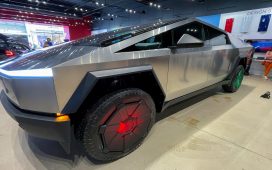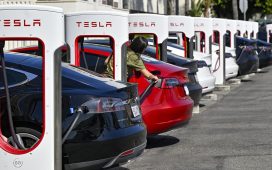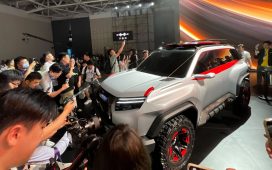Nissan, which in early January became one of the first automakers to warn of an impending shortage, is also prioritizing chip supply to the two best-selling models in each major market, the person said.
In one instance, Nissan flew chip supplies from India to the U.S. on a chartered cargo flight to help production move forward there. A representative for Nissan declined to comment.
Buyers of Renault’s Arkana now have to settle for a smaller display without a navigation map and forgo an option for a phone charger by induction.
Stellantis has modified the Ram 1500 pickup so that the digital rearview mirror that usually comes standard is now available only as an upgrade option, according to a person familiar with the matter. The manufacturer is also using parts that do not require chips from its more basic Ram Classic truck to keep the pricier version moving down the assembly line.
“Given the fluid nature of this complex issue, Stellantis employees across the enterprise are finding creative solutions every day to minimize the impact to our vehicles so we can build the most in-demand products as possible,” spokeswoman Jodi Tinson said in an email.
The car industry’s predicament dates back to poor planning during the pandemic and limited chipmaking capacity, but it’s been compounded by shrinking available cargo space as the global economy recovers from COVID-19. When automakers can secure orders, their chips often cannot ship.
That bottleneck is compounded by the fact that major car-chip makers NXP, Infineon Technologies and Renesas Electronics account for just 40 percent of supply, with the remaining 60 percent split between tens of thousands of smaller designers. Those smaller players often lack the influence to get their chips manufactured at foundries when capacity is tight.
In at least one case, automakers are asking a major chipmaker to send microcontrollers that do not meet standard specifications, a person familiar with the matter said. Those sub-standard chips would not jeopardize safety essentials, like brakes, the person said, but they could mean in-car entertainment or emissions monitoring systems are more likely to malfunction in extreme weather.
Automakers and suppliers can accept whatever chips are available and rewrite the software to give them a new task, said Sig Huber, a consultant at Conway MacKenzie and a former head of purchasing at Fiat Chrysler. Tesla said last week it alleviated issues by reaching out to new semiconductor suppliers and then quickly writing new firmware for those chips.
Stellantis is working on more standardization across its vehicle lineup rather than having to use specific chips for some models, CFO Richard Palmer said on a call with reporters this week.
“More standardization and flexibility, which is key when we have supply constraints,” he said. “We are managing scarcity.”
Automakers are also stocking incomplete cars, or “building shy” in industry parlance, to keep production lines humming.
In Hamtramck, greater Detroit, an area stretching several blocks is filled with Ford F-150 pickup trucks without some chips. General Motors said it is also storing unfinished vehicles while awaiting semiconductors.








